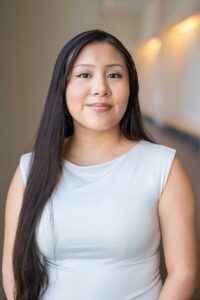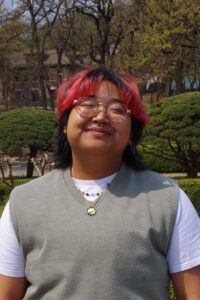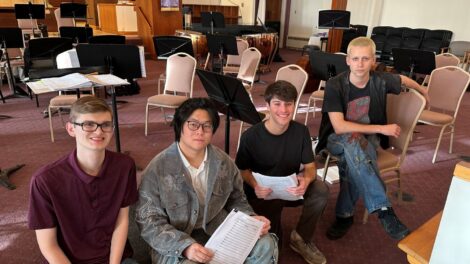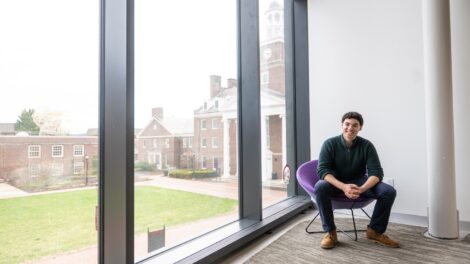Jaly Chimbo Macancela ’26 and Alex Yurtola ’26 share their love of chemistry, life-changing research opportunities, and ambitions of making science more accessible
By Stella Katsipoutis-Varkanis
Jaly Chimbo Macancela ’26 and Alex Yurtola ’26 were each recently awarded a Goldwater Scholarship—one of the most prestigious and competitive undergraduate scholarships available for sophomore and junior STEM majors. They are among 437 college students nationwide chosen from a pool of 1,353 total nominations. Julia Goldberg, associate dean of advising and co-curricular programs, says Lafayette’s 22-year history of producing Goldwater recipients stands as a testament to the College’s excellence in the STEM fields.Â
“I stand in awe of the caliber of our campus applicants, as they all have exceedingly impressive research experiences with Lafayette faculty and at research facilities across the U.S.,” Goldberg says, adding that they also dedicate their time to community and campus service, teaching, and the pursuit of artistic and other intellectual interests outside of the lab. “This year’s nominees and awardees are incredibly well-rounded, talented, and accomplished students committed to tackling urgent problems facing humankind and the environment.”Â
The Barry Goldwater Scholarship and Excellence in Education Foundation honors sophomores and juniors with exceptional academic achievements who intend to earn a doctoral degree and pursue STEM research. The highly competitive scholarship was established in 1986 to identify, encourage, and financially support college sophomores and juniors who show exceptional promise of becoming this nation’s next generation of research leaders in the fields of the natural sciences, engineering, and mathematics.
We sat down with the College’s awardees to chat about their research and role models at Lafayette, visions for the future, and dreams of championing inclusivity through science.
 Jaly Chimbo Macancela ’26
Jaly Chimbo Macancela ’26
Major: Biochemistry
Post-graduation plans:Â Pursue a D.M.D.-Ph.D. or D.M.D. degree with a research focus on oral diseases that disproportionately affect underserved communities.
How I want to make an impact: I hope to join a lab focused on exploring the interplay between the oral microbiome and systemic health. By integrating clinical dentistry with biochemical research, I aim to uncover how oral health influences broader physiological systems and contributes to the development of preventive and therapeutic strategies. My goal is to reduce oral health disparities and ensure more equitable access to care.
How would you describe yourself as a student and scholar?
To me, being a scholar means learning with purpose while helping others feel seen, supported, and inspired. I value community and growth. As a first-generation college student and woman of color in STEM, I’ve learned to advocate for myself and others by building inclusive, supportive communities.Â
I co-founded the Protactinium Chapter of Iota Sigma Pi in the Lehigh Valley to uplift women and nonbinary chemists through mentorship and networking. On campus, I serve as secretary of the Hispanic Society of Lafayette, where I help plan cultural events that celebrate LatinĂ© identity and build community. I also work with middle school students in Easton through LafKid Connect, creating activities that encourage interest in higher education.Â
Give us a rundown of your research. What about it excites your interest?
Computational modeling and simulation are invaluable tools for exploring complex biological systems and enhancing experimental design. As a biochemistry student interested in intracellular signaling, I was eager to dive into computer science. Prof. Heidi Hendrickson’s lab provided the perfect opportunity to combine these fields, focusing on proteins that are also being researched as potential drug targets in dental applications.
In my research, I use molecular dynamics to investigate how G-protein coupled receptors (GPCRs) interact with their associated G-proteins. Specifically, I study the interactions between Gα subunits and four receptors in the E-prostanoid family, which play pivotal roles in many physiological processes. Gaining a deeper understanding of these molecular interactions is essential for developing targeted therapies for diseases linked to dysregulated GPCR signaling.
Who has had the greatest influence on your scholarly journey?
During my freshman year, I joined the Science Horizons program, which offers mentoring and research opportunities to first-year students. I expressed interest in Prof. Eric Ho’s bioinformatics and genomics lab, which introduced me to computational research early on. Later, I joined Prof. Hendrickson’s lab, where I’ve received unwavering support. Prof. Hendrickson encouraged me to attend my first science conference and present my research. Her mentorship has helped shape my identity as a researcher and strengthened my confidence in pursuing long-term career goals.
How has being an undergraduate student-researcher at Lafayette helped shape your goals?
Lafayette’s close-knit academic community has been foundational in shaping my aspirations. Programs like Science Horizons and Bergh Family Fellows allowed me to begin research early, and the Joseph A. Sherma Chemistry Research Fund provided an immersive summer of independent investigation. The Chemistry Department has been incredibly supportive, offering both mentorship and opportunities to grow as a leader. Serving as a general chemistry lab teaching assistant and an organic chemistry supplemental instruction leader has deepened my understanding of core scientific concepts while strengthening my ability to communicate complex ideas clearly and effectively. These skills are essential in a collaborative research setting and in clinical dental care.
What does the Goldwater Scholarship mean to you?
The Goldwater Scholarship has reaffirmed that I belong in science. It has shown me that I am on the right path to building a future in dental research and has opened doors to a rigorous, meaningful career that combines research and health care to improve lives. I am deeply grateful to the professors, family, and friends who encouraged me to apply, especially during moments when I doubted whether I was deserving of such an honor. Receiving this recognition is both humbling and motivating, and it fuels my drive to make a lasting impact through my work in science.
 Alex Yurtola ’26
Alex Yurtola ’26
Major: Chemistry
Post-graduation plans: Obtain a Ph.D. in chemical biology. Currently, Seoul National University and University of California-Berkeley have both caught my attention with their robust programs. My overall goal is to lead a chemical biology lab as a principal investigator and professor. Â
How I want to make an impact: I want to encourage interest in science—especially in younger generations and marginalized communities—and make science more accessible. In addition to my aspirations for professorship, I hope to establish an outreach initiative to provide more opportunities for underserved students who are interested in science.
How would you describe yourself as a student and scholar?
Transdisciplinary. As a chemistry major and visual artist, I have a unique sense of creativity when it comes to approaching academics and research. I am driven and eager when faced with a challenge. I find myself taking classes in the Religious Studies Department out of sheer curiosity, giving me an appreciation for deep-diving analyses. I am very passionate about oil painting, cultural exchange, and chemistry.
Give us a rundown of your research. What about it excites your interest?
Quorum sensing is an incredible phenomenon that allows bacteria to communicate and synchronize certain beneficial behaviors. One species that has been found to undergo quorum sensing is Lactiplantibacillus plantarum, a beneficial gut bacteria found in fermented food and has been observed to relieve gut inflammation.Â
My research focuses on quantifying and upregulating the quorum sensing abilities of L. plantarum through the use of synthetic peptides. During my first year of research, I worked on developing a bioassay that uses color change as an indicator of successful quorum sensing. Currently, I am working on further optimizing this bioassay by engineering a plasmid and inserting this DNA into L. plantarum.Â
Initially, I was drawn to this research by the idea that bacteria are able to communicate. I had never heard of quorum sensing before, and learning that these tiny organisms are able to collaborate piqued my curiosity. How were these microscopic beings able to work together? I knew I had to learn more, and Prof. Michael Bertucci’s lab welcomed me with open arms.
Who has had the greatest influence on your scholarly journey?
When I first arrived as an intended chemistry major, I had little to no idea what I wanted to do after graduation. Now, thanks to the wonderful mentors I’ve had here at Lafayette, I have a much clearer vision for my future.Â
The first chemistry class I took at Lafayette was taught by Prof. Rebecca Miller, who encouraged me to get involved in research within the Chemistry Department. She inspired me to dig deeper into my passion for teaching through tutoring and working as a teaching assistant for general chemistry labs. Without her encouragement and support, I wouldn’t have had the confidence to apply for the Goldwater Scholarship.
Prof. Miller introduced me to Prof. Bertucci’s research during my first year, and I have been involved with research ever since. Prof. Bertucci has guided me through the learning process that is research—from handling frustrating sets of data to writing a paper. He has always encouraged me to take ownership of my research, which is not only important for the Goldwater application but also gives me confidence in my work. Prof. Bertucci has provided me with a space to grow and learn as a scientist, and I am deeply grateful for all his support and guidance.
How has being an undergraduate student-researcher at Lafayette helped shape your goals?
Working in Prof. Bertucci’s lab has uncovered my love for hands-on lab work and has driven me to pursue a career in research and education. The guided creativity that comes with working as a student-researcher has challenged me to branch out from my chemistry major into biology and genetics. I hope to continue to explore more connections between chemistry and other fields throughout the rest of my academic career.
What does the Goldwater Scholarship mean to you?
I am absolutely overwhelmed to have received this scholarship. On top of providing crucial financial support, I feel as if the work and dedication I have committed to my research has been acknowledged and rewarded. I am very grateful to the mentors and support I’ve had on the path to this scholarship.Â
 Jaly Chimbo Macancela ’26
Jaly Chimbo Macancela ’26 Alex Yurtola ’26
Alex Yurtola ’26
